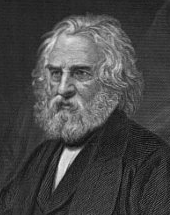Henry Wadsworth Longfellow
|
|
Henry Wadsworth Longfellow (February 27, 1807 – March 24, 1882) was an American poet who wrote many poems that are still famous today, including The Song of Hiawatha and Evangeline. He also wrote the first American translation of Dante Alighieri's Hell (Inferno). Longfellow lived for most of his life in Cambridge, Massachusetts, in a house occupied during the American Revolution by Gen. George Washington and his staff.
He was the son of Stephen Longfellow and Zilpah Wadsworth Longfellow. He was born in Portland, Maine. His father was a lawyer and his maternal grandfather a general in the American Revolutionary War. He was descended from the Longfellow family who came to America in 1676 from Otley in Yorkshire, England and from Priscilla and John Alden on his father's side.
He studied at Bowdoin College and went on to become librarian and the first professor of modern languages there after touring Europe between 1826 and 1829.
In 1831, he married Mary Storer Potter who died a few years later (1835) in Rotterdam while the couple was travelling. He took up a professorship at Harvard University and later married Frances "Fanny" Appleton, living at Craigie House, overlooking the Charles River.
While he was courting Miss Appleton, he frequently walked from Harvard to her home in Boston, crossing the river via the West Boston Bridge. That bridge was subsequently demolished and replaced in 1906 by a new bridge, which was eventually renamed as the Longfellow Bridge.
He retired from Harvard in 1854, devoting himself entirely to writing. He was awarded an honorary doctorate of Laws from Harvard in 1859. In 1861, Frances died in a household fire, devastating Longfellow. He commemorated her with the sonnet "The Cross of Snow" (1879). He died on March 24, 1882.
Henry Wadsworth Longfellow is buried at Mount Auburn Cemetery, Cambridge, Massachusetts. In 1884 he was the first American poet to have a bust of him placed in Poet's Corner of Westminster Abbey in London.
His work was immensely popular during his time and is still somewhat today, but many modern critics consider him too sentimental. His poetry is based on familiar and easily understood themes with simple, clear, and flowing language. His poetry created an audience in America and contributed to creating American mythology.
Longfellow's home in Cambridge is a U.S. National Historic Site, National Historic Landmark, and on the National Register of Historic Places. A 2/3 scale replica was built in Minneapolis, Minnesota at Minnehaha Park in 1906 and once served as a centerpiece for a local zoo.
Quotes and manuscript
| The Village Blacksmith
Under a spreading chestnut tree His hair is crisp, and black, and long, Week in, week out, from morn till night, And children coming home from school | Missing image Longfellow_Village_Blacksmith_(manuscript_1).jpg The Village Blacksmith (manuscript page 1) |
External links
Template:Wikisource author Template:Wikiquote
- Some of Henry Wadsworth Longfellow's works (http://onlinebooks.library.upenn.edu/webbin/book/search?amode=start&author=Longfellow,+Henry+Wadsworth) in electronic form listed at the Online Books Pagede:Henry Wadsworth Longfellow
fr:Henry Longfellow nl:Henry Wadsworth Longfellow pl:Henry Wadsworth Longfellow

